Also see:
Overview
Disinformation is a subset of propaganda and is false information that is spread deliberately to deceive. It is also known as black propaganda. It is sometimes confused with misinformation, which is false information but is not deliberate. (wikipedia)
Required Reading:
- Are Effective COVID Medications Like Ivermectin Being Suppressed Because Their Successful Treatments Could Cause Vaccines to Lose Government Funding?

- Renowned French Doctor Who Identified Inexpensive Cure for Coronavirus – Top Critic Linked to Gilead and Remdesivir
- The Lancet Study on Hydroxychloroquine Was a COMPLETE FRAUD – The Authors are Linked to the Pharmaceutical Industry and People Died Because of Their Lies!
Example of Ivermectin Disinformation
Summary
- Rolling Stone creates a disinformation article claiming that hospitals are overflowing with people overdosing on Ivermectin, which is a “horse de-wormer”.
- They used a fake photo, a doctor who didn’t work at the hospital at that time.
- The hospital completely denied their claims.
Details
- Disinformation article: The Rolling Stone article – this includes their “corrections”.
- Disinformation article: Oklahoma’s ERs are so backed up with people overdosing on ivermectin that gunshot victims are having to wait to be treated, a doctor says
- Disinformation article: https://www.theguardian.com/world/2021/sep/04/oklahoma-doctor-ivermectin-covid-coronavirus
- Disinformation article Oklahoma Ch.4 KFOR: Patients overdosing on ivermectin backing up rural Oklahoma hospitals, ambulances
- This fake news went on all the mainstream media regulars (e.g. Rachel Maddow) without retraction and admittance of full journalistic fraud.
- Effects:
- Ivermectin is villainized.
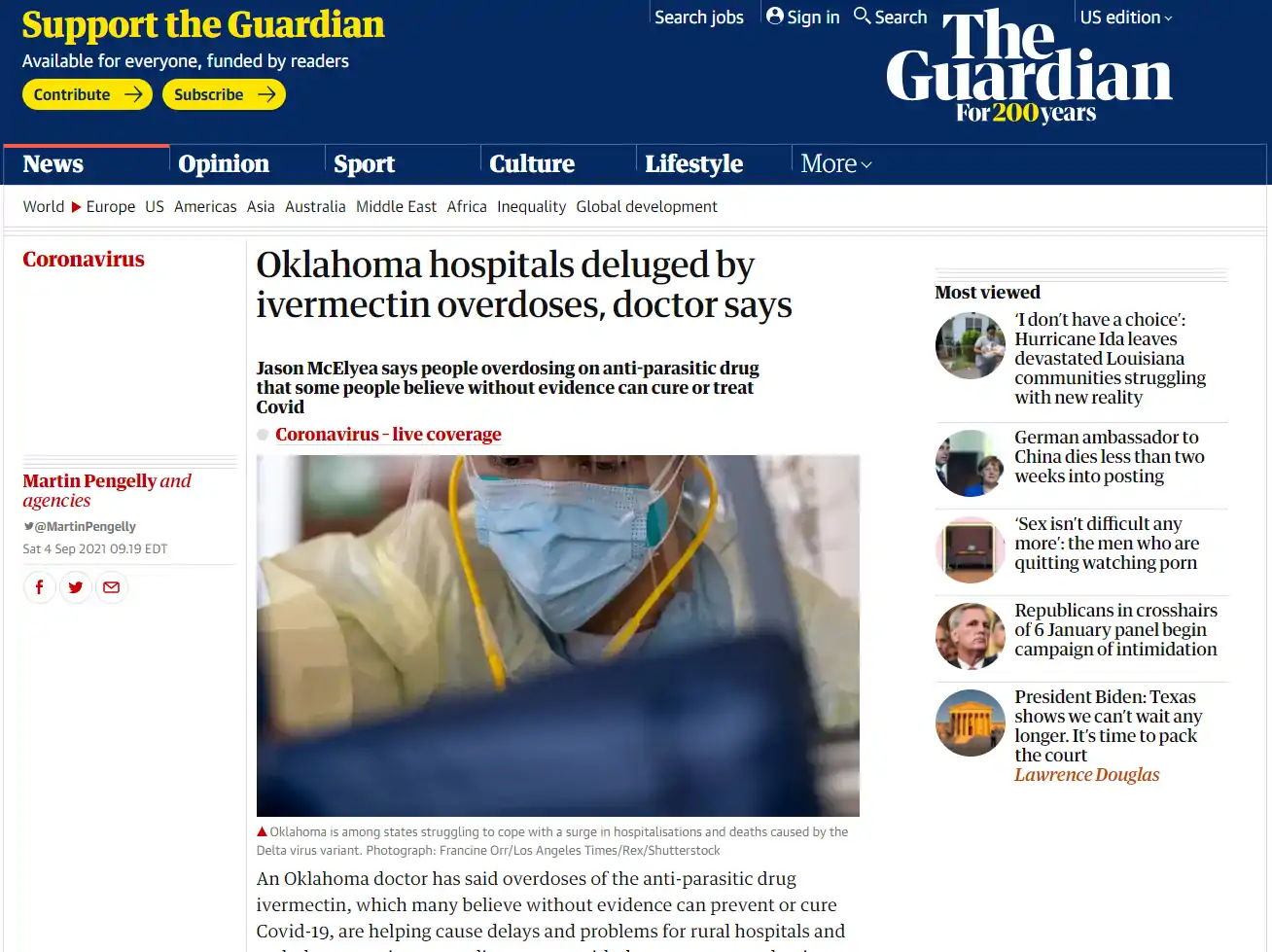
Sequoia Completely Debunks Rolling Stone

Videos
Disinformation Hitpiece Example
Real Investigative Journalism


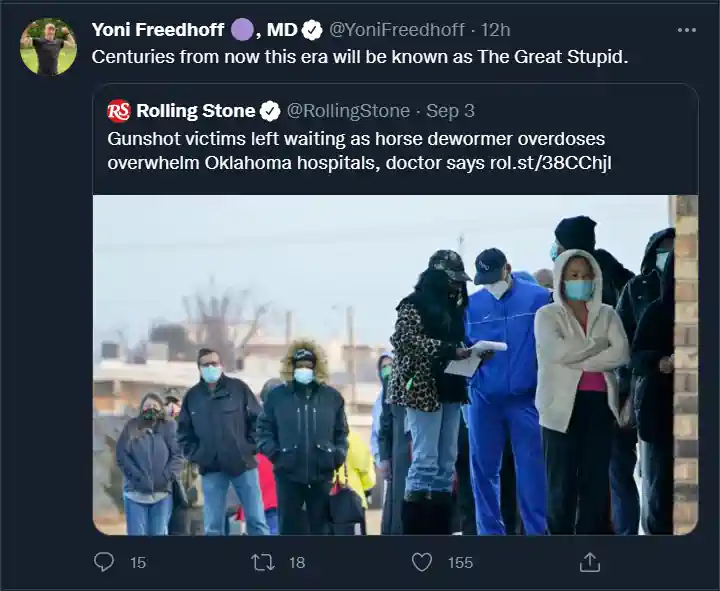
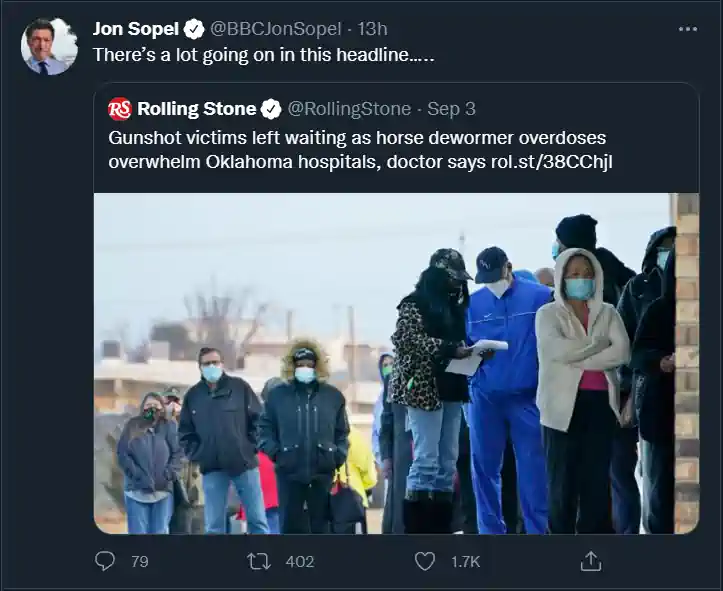
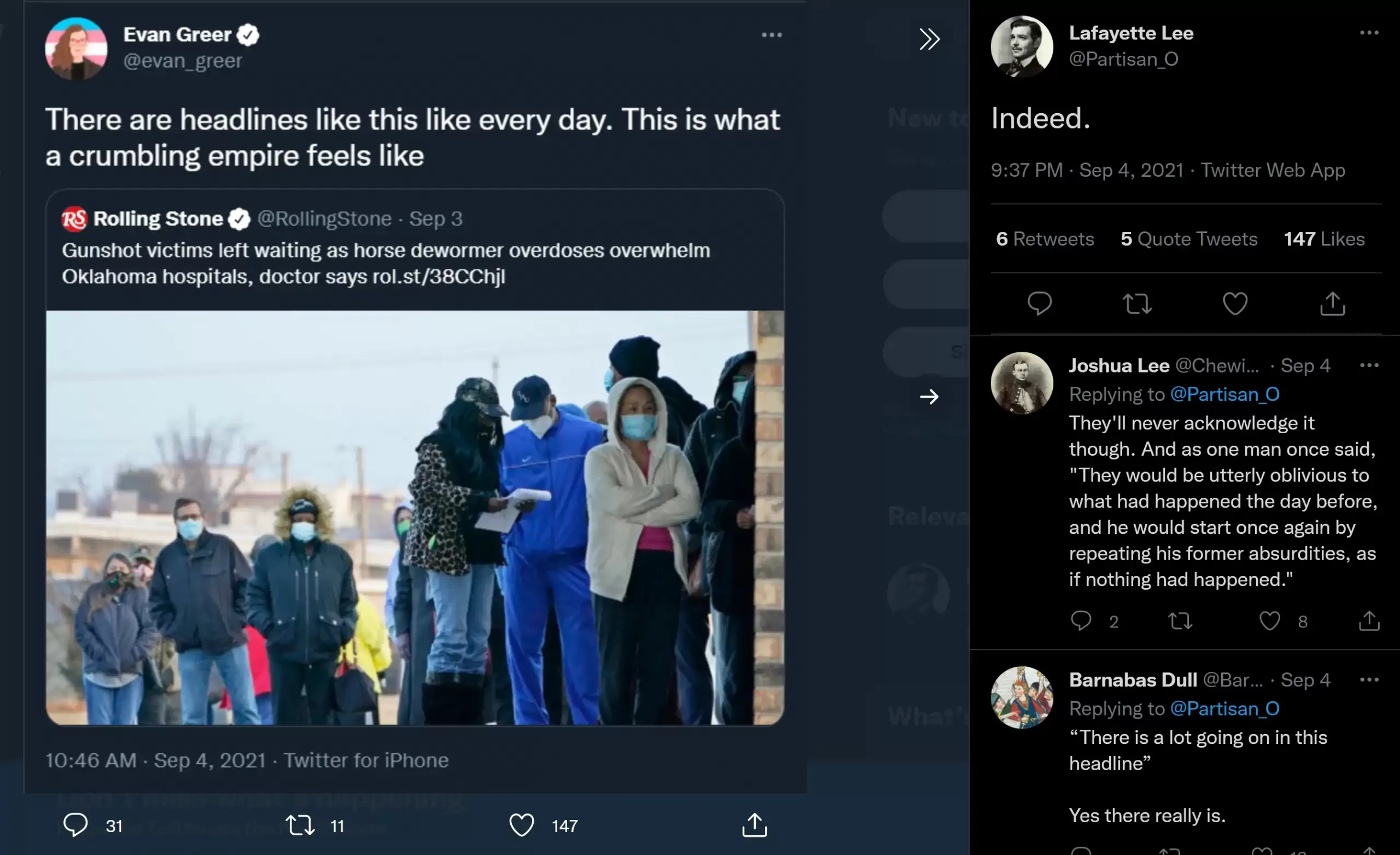
More examples of the media echo chamber of disinformation
CDC is lying about breakthrough cases

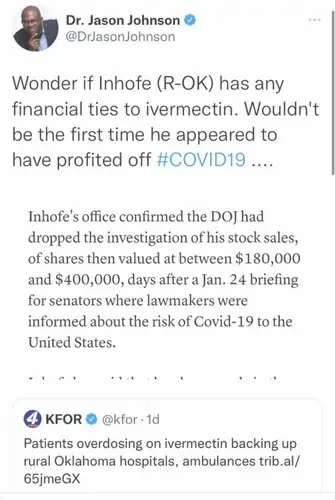
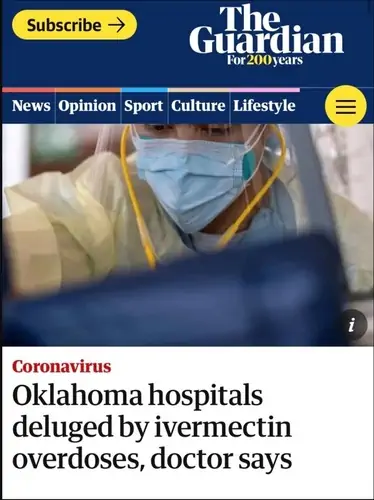

Dis-information is being spread by medical agencies and the federal government:
- They are accusing good doctors of the very dis-information that medical boards and governments are perpetrating.
- Federation of State Medical Board’ – FSMB: Spreading Covid-19 Vaccine Misinformation May Put Medical License At Risk
More Information
There appears to be a corporate-medical effort to spread disinformation (false information) about any COVID-19 treatment unless it involves a vaccine. All roads lead to vaccination, for some reason… Doctors are having their licenses threatened for using drugs such as Hydroxychloroquine and Ivermectin or for speaking out in the public about their benefits. Here’s an example of dis-information.
Dr. O’Neal says, while Ivermectin does have some antiviral properties, the latest studies show it doesn’t work against the coronavirus.
“Through the Spring we got better data. That says it doesn’t. So, now we have to let it go. We’ve tried lots of things during this pandemic, some have worked, some have not. Ivermectin doesn’t work,” said Dr. O’Neal.
Dr. Aldo Russo over at Ochsner Baton Rouge agrees.
“It appeared to have some sort of effect on the virus in-vitro, meaning in the lab. Now when the research continued in humans with COVID-19, the medication was not beneficial at all,” said Dr. Aldo Russo, Regional Medical Director for Ochsner Baton Rouge.
62-year-old Louisiana resident Darleen Asevedo died Saturday while struggling with the coronavirus from home. Her daughter, Kortney, says her mom was not vaccinated and was taking Ivermectin.
“Everybody has given me different information about what she should’ve been doing. Everybody is wrong,” said Kortney Asevedo.
“You’re seeing patients with COVID-19 come into your hospital, saying they used Ivermectin as a treatment?” questioned Lester Duhe’.
“Yeah, over the past 20 months, we have seen people that have taken Ivermectin that was prescribed to animals, and try to use it to prevent or even treat COVID,” said Dr. Russo.
These doctors say getting the shot, is your best protection against COVID for now.
“It is the saddest thing to have somebody come in and say, but I was taking my Ivermectin. And have to admit them to a hospital, put them on a breathing machine, when we have great prevention. And that is the vaccine,” said Dr. Russo.
Meanwhile, former reporters such as Ivory Hecker have come out and confirmed this corporate pro-vaccine agenda that is spread through mis-information, dis-information, or propaganda.
The real world use of Ivermectin and other repurposed drugs following treatment protocols administered by the FLCCC and America’s Frontline Doctors has yielded incredible results.
- Dr. Varone in Houston Has Amazing Success with MATH+ (Ivermectin) – Censored by Media
- Ivory Hecker
- Dr. Joseph Varone
Note: if patients are dying from Ivermectin at home it is probably because they are not following the various FLCCC and AFLD protocols. Ivermectin by itself is not effective. It is part of a combination of drugs that have to be used in specific concentrations. Also, the effectiveness of any treatment decreases the farther along a person is in the stages of infection. (See Treatments)
Entire countries have had spectacular success, such as India.
As you can see, Ivermectin made a huge difference in India, meanwhile vaccines resulted in a huge increase for reasons such as Immune Escape, Antibody Dependent Enhancement, resulting in Breakthrough cases.
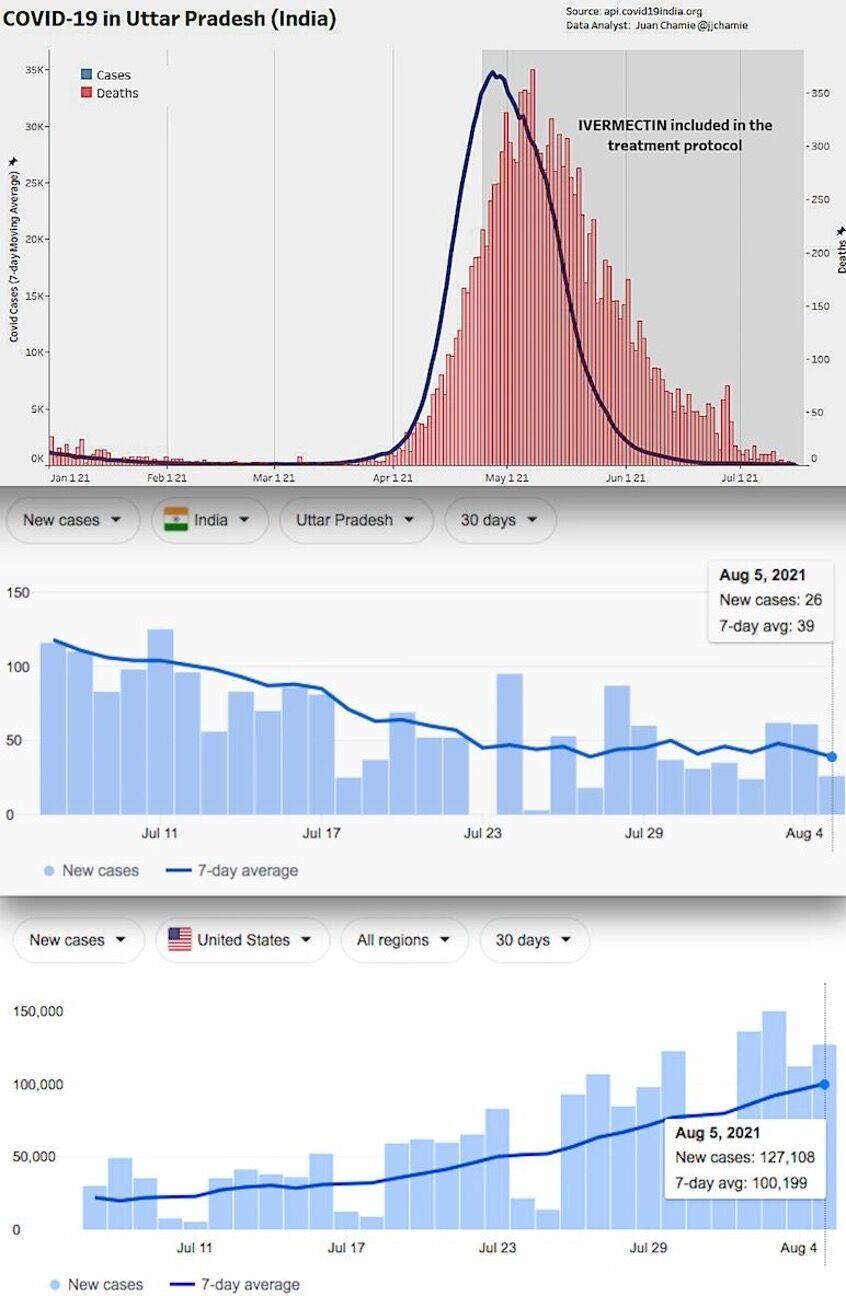
Scientist is Attacked
Original Post
Janci Lindsay, Ph.D. ‘Managing Director of Toxicology & Molecular Biology Toxicology Support Services, LLC. Edited Just to be clear scientifically, itis the vaccinated NOT the unvaccinated spreading the mutant variants. This is from inoculating during the pandemic with a poor neutralizing *vaccine’. This is what has happened with numerous other “leaky” (non-neutralizing) vaccines. The classic example of this is Marek’s disease in chickens. warned the CDC of this in April of this year. Other scientists warned the CDC as well as similar scientific entities world-wide, months earlier. Yet here we are. So please spare me the propaganda that the unvaccinated are the ones causing” this because they are not and there is a clearly defined mechanistic pathway for how the vaccinated are creating the mutants. The solution would be to STOP vaccinating with these terrible GTs and start treating everyone at high risk and those not at high risk who are symptomatic with cheap safe and effective hydroxychloroquine and ivermectin until the virus is driven out. This would stop the binding, replication and transmission of the virus as well as ameliorate some pathogenic processes due to spike in the vaxxed. Oh and it would cost virtually nothing… and therein lies the problem!
Fake News 1
source: https://factcheck.afp.com/scientist-makes-inaccurate-claims-covid-19-vaccine-safety
Scientist makes inaccurate claims on Covid-19 vaccine safety
An American scientist claims that Covid-19 vaccines pose safety concerns, including sterilization and changes to DNA, in remarks shared on social media. But experts and public health bodies say there is no evidence that mRNA shots are causing reproductive problems, and are not modifying the genes of recipients.
“Molecular Biologist Dr. Janci Chunn Lindsay: ‘We could be Sterilizing an Entire Generation,’” warns the title of a Bitchute video viewed more than 8,000 times.
It includes audio and a transcript of remarks made during the April 23, 2021 public comments section during a meeting of the US Centers for Disease Control and Prevention (CDC) Advisory Committee on Immunization Practices (ACIP) by Dr Janci Chunn Lindsay, who confirmed to AFP she was the speaker.
She says she feels strongly that the inoculations “must be halted immediately due to safety concerns on several fronts.”
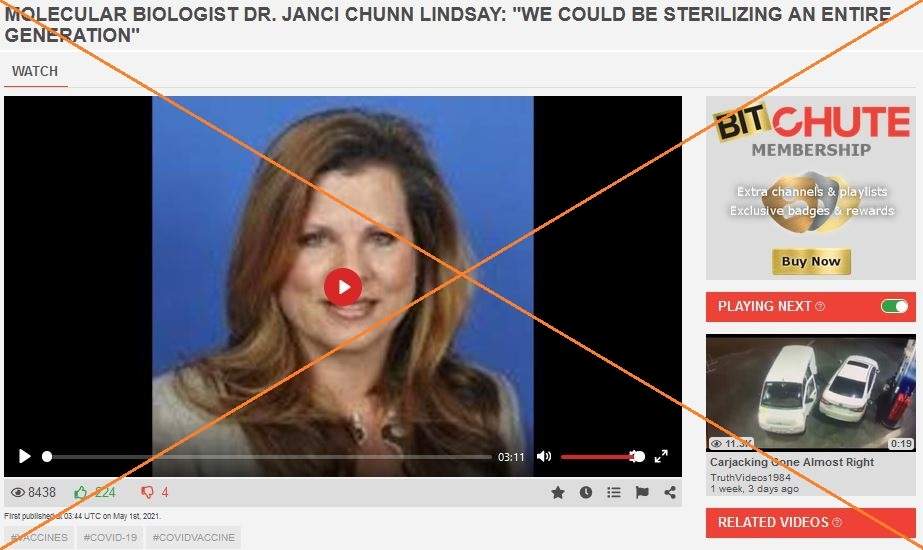 Screenshot taken from bitchute.com on May 11, 2021
Screenshot taken from bitchute.com on May 11, 2021Posts sharing the speech can be found across social media, and a transcript has been shared more than 2,000 times on Facebook, according to the social media monitoring tool CrowdTangle.
Countries around the world are seeking to immunize their populations against Covid-19, which has killed more than 3.3 million people. But inaccurate claims about the vaccines are spreading across the internet, despite efforts by social media companies to stop them and assurances from health authorities that the shots are safe and effective.
More than 261 million Covid-19 vaccine doses have been administered in the United States. Most were Pfizer’s and Moderna’s mRNA vaccines, though a shot from Johnson & Johnson that uses different technology is also being used.
Below, AFP Fact Check breaks down some of the claims made in the video.
Claim: Covid-19 vaccines will ‘cross-react’ and cause reproductive problems
Lindsay claims that “there is credible reason to believe that the (Covid vaccines) will cross-react with the syncytin and reproductive proteins in sperm, ova, and placenta, and lead to impaired fertility and reproductive outcomes.”
But there is no evidence that they do, according to multiple experts.
Syncytin-1 is a protein essential for placental formation.
The mRNA vaccines developed by Pfizer-BioNTech and Moderna differ from previously administered inoculations. Instead of confronting the immune system with part of a virus in a weakened or deactivated form to build antibodies, they give it a “blueprint” of a part of the virus (the spike protein) that the body can then recognize and fight when confronted by it later.
The CDC says that “there is currently no evidence that any vaccines, including Covid-19 vaccines, cause fertility problems.”
In a joint statement, the American College of Obstetricians and Gynecologists, the American Society for Reproductive Medicine and the Society for Maternal-Fetal Medicine also said that “there is no evidence that the vaccine can lead to loss of fertility.”
While fertility was not specifically studied in clinical trials of the vaccines, the statement explains that “no loss of fertility has been reported among trial participants or among the millions who have received the vaccines since their authorization, and no signs of infertility appeared in animal studies. Loss of fertility is scientifically unlikely.”
Dasantila Golemi-Kotra, a microbiologist at York University, told AFP that “vaccine-induced antibodies against SARS-CoV-2 spike protein are unlikely to cross-react with the syncytin-1 or -2 in the body and lead to infertility.”
She explained that the misinformation may stem from the fact that the anti-spike protein antibodies and the syncytin-1 protein of the placenta share a “very short amino acid region.”
But this does not mean that the immune system would attack the syncytin protein. The immune system can “recognize a surface in their target protein, which rarely is confined to a single short amino acid sequence,” she said.
Dervila Keane, a Pfizer spokeswoman, agreed.
“It has been incorrectly suggested that Covid-19 vaccines will cause infertility because of a very short amino acid sequence in the spike protein of SARS-CoV-2 virus that is shared with the placental protein, syncytin-1,” she said.
The sequence shares just four amino acids and is therefore too short to “plausibly give rise to autoimmunity,” or prompting the body’s immune system to attack its own cells, Keane said.
This Twitter thread from immunologist Andrew Croxford shows that other proteins in the human body also share short amino acid sequences with the SARS-CoV-2 spike protein, without inducing an autoimmune response.
Annette Beck-Sickinger, professor at the University of Leipzig, agreed, explaining that “if this syncytin claim was true, every woman who has been previously infected with Covid-19 would consequently be infertile, but this is not the case.”
AFP Fact-Check has examined other claims that mRNA vaccines caused infertility here and here.
Claim: Miscarriages and disrupted menstrual cycles following Covid-19 vaccination
Lindsay claims that as of early April, “we have seen 100 pregnancy losses,” and “we have heard multiple reports of menses irregularities in those vaccinated.”
But there is no current indication that Covid-19 vaccines negatively affect women’s pregnancies, according to experts and public health bodies.
The CDC said in February that it had not identified any trends of miscarriages following Covid-19 immunization.
“To date, no evidence has indicated an increase in miscarriages after Covid-19 vaccines, and no concerning patterns of reporting have been observed,” a spokesperson said.
The CDC also states on its website that “based on how these vaccines work in the body, experts believe they are unlikely to pose a specific risk for people who are pregnant.”
Preliminary findings from a study published in April 2021 in The New England Journal of Medicine “did not show obvious safety signals among pregnant persons who received mRNA Covid-19 vaccines,” according to its authors.
The study tracked participants via the CDC’s V-safe app, which prompts people to self-report adverse events following vaccination. It found that from 827 completed pregnancies, 712 resulted in live births, while 115 (13.9 percent) were lost.
According to the Mayo Clinic, miscarriage “is a relatively common experience” and occurs in about 10-20 percent of known pregnancies, often when the fetus is not developing normally.
A March 2021 Nature Reviews Immunology article examining the safety of vaccines for pregnant women explains that while they were excluded from the clinical trial for the vaccines and women participating were advised not to become pregnant, a small number did. Their pregnancies were not negatively affected compared to the pregnancies that occurred in the control group.
Results from the limited subset show that “there was no significant difference in the rate of accidental pregnancies in the vaccinated groups compared with the control groups, which indicates that the vaccines do not prevent pregnancy in humans,” the article said.
“Similarly, the miscarriage rates are comparable between the groups, indicating no detrimental effect of vaccination on early pregnancy.”
In February 2021, Pfizer-BioNTech started a study to specifically assess the safety of its vaccine in pregnant women.
Lindsay also cites “multiple reports” that Covid-19 can disrupt menstrual cycles.
Research is underway to determine if there is a causal relationship between the two. Some experts suggest that the added stress of the pandemic could play a part in cases in which women experienced menstrual changes.
Kathryn Clancy, associate professor in the Department of Anthropology at the University of Illinois Urbana-Champaign, is leading research on the possible causal links between Covid-19 vaccines and menstrual cycle changes.
She previously said that multiple biological mechanisms might underlie menstrual changes with vaccination. “These are related to changes in platelets, inflammatory processes, and vasodilation, all normal immune activation responses that you want to see with vaccination.”
“So menstrual changes are not concerning, but rather short-term side effects that are similar to sore arm, fatigue, fever,” she added.
Claim: Reported blood clots were caused by the Covid-19 vaccines
The scientist goes on to claim that “all of the gene therapies (Covid-19 vaccines) are causing coagulopathy,” as purportedly demonstrated by hundreds of reports related to blood clotting disorders in the US Vaccine Adverse Events Reporting System (VAERS).
Scientists have widely rejected the unsubstantiated claim that mRNA vaccines can modify human DNA, and AFP Fact Check has debunked other social media posts sharing the false assertion here and here.
Reports appearing in VAERS alone “cannot be used to determine if a vaccine caused or contributed to an adverse event or illness,” says a disclaimer that users must indicate they have read and understood before accessing the system’s data.
An official description of VAERS, which is run by the CDC and the US Food and Drug Administration (FDA), says it “contains information on unverified reports of adverse events (illnesses, health problems and/or symptoms) following immunization with US-licensed vaccines,” and that it accepts reports “from anyone.”
There have been reports of blood clots associated with low platelets following vaccination with the adenoviral (non-mRNA) vaccines from Johnson&Johnson/Janssen and Oxford/AstraZeneca, but these events are very rare.
The US paused delivery of the Johnson&Johnson shots because of blood clot concerns, but the CDC and FDA recommended they resume after data showed 23 confirmed reports of thrombocytopenia syndrome (TTS), which involves blood clots with low platelets, out of more than 8.4 million doses administered.
“The data show that TTS is a rare adverse event. The known and potential benefits of the J&J/Janssen vaccine outweigh its known and potential risks,” the CDC said on its website.
Several European countries also halted distribution of the Oxford/AstraZeneca vaccine, which uses a similar technology to the J&J shot, after reports of blood clots following vaccination.
The vaccine, which has not yet been authorized in the United States but is in Canada, was then reviewed by the European Medicines Agency (EMA).
The EMA found that after a preliminary review, “the vaccine may be associated with very rare cases of blood clots associated with thrombocytopenia, i.e. low levels of blood platelets.”
Like the CDC, the EMA concluded that “the benefits of the vaccine in combating the still widespread threat of Covid-19 (which itself results in clotting problems and may be fatal) continue to outweigh the risk of side effects.”
The EMA said it was monitoring whether mRNA vaccines from Pfizer and Moderna could be linked to rare cases of blood clotting, but there was no indication so far.
AFP Fact Check has examined numerous false or misleading claims on Covid-19 vaccines, available here.
Fake News 2
source: https://healthfeedback.org/claimreview/janci-chunn-lindsays-claims-that-covid-19-vaccines-are-unsafe-are-inaccurate-and-unsupported-by-scientific-evidence/
Janci Chunn Lindsay’s claims that COVID-19 vaccines are unsafe are inaccurate and unsupported by scientific evidence
FULL CLAIM: “There is a credible reason to believe that the COVID-19 vaccines will cross-react with the syncytin and reproductive proteins in sperm, ovaries, and placenta, leading to impaired fertility and impaired reproductive and gestational outcomes”; “all of the gene therapies [COVID-19 vaccines] are causing coagulopathy”; “there is strong evidence for immune escape, and that inoculation under pandemic pressure with these leaky vaccines is driving the creation of more lethal mutants”
REVIEW
In early August 2021, several posts (see examples here, here, and here) claiming that COVID-19 vaccination will cause fertility problems, blood clotting, and and improve the virus’ ability to evade the immune response (immune escape) went viral on Facebook, Instagram, and Twitter. The posts shared claims made by molecular biologist Janci Chunn Lindsay at a 23 April 2021 meeting from the U.S. Advisory Committee on Immunization Practices (ACIP) in Atlanta, Georgia. This particular meeting focused on discussing the reported cases of blood clotting following COVID-19 vaccination.
During the public comment session, Lindsay gave a three-minute speech calling to halt COVID-19 vaccination over concerns about vaccine safety. Audio recordings and transcripts of Lindsay’s speech went viral on the video hosting platforms YouTube and Bitchute, where they received more than 70,000 views.
Journalist Jennifer Margulis published on her website a transcript with additional comments from Lindsay. Different versions of Lindsay’s claims continued circulating on social media platforms, boosted by this post in Lindsay’s Linkedin profile and periodic interviews in which Lindsay repeated her claims. Some examples are this 14 May interview for the podcast Canadian Patriot and this one on 11 June for the Whistleblower Newsroom podcast.
Lindsay’s speech contained several inaccurate, unsupported, and misleading claims that we will address in this review.
Claim 1(Inaccurate and Unsupported):
“There is a credible reason to believe that the COVID-19 vaccines will cross-react with the syncytin and reproductive proteins in sperm, ovaries, and placenta, leading to impaired fertility and impaired reproductive and gestational outcomes”
This claim is based on the alleged similarity between the genetic sequences of the SARS-CoV-2 spike protein used to develop the COVID-19 vaccines and the protein syncytin-1. This protein allows placenta cells to fuse together for the correct development of the placenta during pregnancy and is also present in sperm[1].
Lindsay claimed that the similarity between both proteins would cause the immune system to detect and attack syncytin-1 within the body of vaccinated people, due to a phenomenon called cross-reactivity. Akiko Iwasaki, an immunologist at Yale University School of Medicine, examined this possibility by analyzing the serum from women with SARS-CoV-2 antibodies induced by infection or vaccination. She found no reactivity to syncytin-1 in any of them.
François Balloux, director of the Genetics Institute at the University College London, showed in this tweet that the similarity between the sequences of the spike protein of SARS-CoV-2 and syncytin-1 is too low to result in cross-reactivity and therefore cannot cause an autoimmune reaction against the placenta. Such a small region of similarity is not unique to the SARS-CoV-2 spike protein and can also be observed in many other human proteins, like hemoglobin, as Health Feedback explained in this review. That review also pointed out that the spike protein of common cold coronaviruses also share small regions of similarity with syncytin-1. If such a small level of similarity was sufficient to lead to an autoimmune reaction against syncytin-1, we would see fertility problems even in people who had the common cold, but this isn’t the case.
Lindsay further claimed that reports of miscarriages and menstrual irregularities in the U.S. Vaccine Adverse Reporting System (VAERS) provide evidence that COVID-19 vaccines might affect fertility. As Health Feedback explained on numerous occasions, VAERS data alone can’t demonstrate whether a vaccine caused an adverse event. This is a misuse of VAERS reports, which simply show that an adverse event occurred after vaccination, but don’t on their own establish a causal link. Demonstrating a causal relationship would require showing a higher rate of the event among vaccinated people than in the general population and a potential mechanism linking the vaccine with the adverse event.
The U.S. Centers for Disease Control and Prevention (CDC) state that “currently no evidence shows that any vaccines, including COVID-19 vaccines, cause fertility problems”. In February 2021, the American College of Obstetricians and Gynecologists, the American Society for Reproductive Medicine, and the Society for Maternal-Fetal Medicine issued a joint statement to the same effect. The American College of Obstetricians and Gynecologists currently states that “claims linking COVID-19 vaccines to infertility are unfounded and have no scientific evidence supporting them”, and recommend vaccination for all eligible people who may consider future pregnancy.
The results of recent studies on this subject are reassuring and don’t indicate that COVID-19 vaccines affect fertility. In June 2021, one study published in Fertility and Sterility Reports used in vitro fertilization frozen embryo transfer to evaluate fertility in vaccinated women, women who were previously infected with SARS-CoV-2, and women who had been neither vaccinated nor infected. The researchers found no difference in embryo implantation and early pregnancy development between the three groups[2]. Another small study published in JAMA found no decrease in sperm count, volume, and motility in 45 men before and after receiving an mRNA COVID-19 vaccine[3].
There is currently insufficient evidence to draw a causal link between COVID-19 vaccination and reports on menstrual irregularities, as Health Feedback explained in this review. The gynecologist Jen Gunter explained in her blog The Vajenda that these effects could be due to the vaccine itself, the immune system response to the vaccine, or other factors such as fever, discomfort, or stress related to vaccination.
To shed light on this question, the U.S. National Institutes of Health encourages researchers to investigate whether COVID-19 vaccines can induce changes in menstruation. In April 2021, Kate Clancy, a professor of anthropology at the University of Illinois Urbana-Champaign, and Katharine Lee, a public health researcher at the Washington University School of Medicine, launched a social media survey to investigate these effects. After collecting more than 140,000 reports on menstrual irregularities, the researchers are now documenting and studying these cases.
Claim 2 (Inaccurate and Misleading):
“All of the gene therapies [COVID-19 vaccines] are causing coagulopathy”
Firstly, the claim that COVID-19 vaccines are gene therapy is inaccurate, as Health Feedback explained earlier in this review. Gene therapy uses viral vectors that provide the molecular machinery necessary to introduce DNA into a patient’s genome to treat a disease. However, gene therapy doesn’t use RNA, and mRNA vaccines don’t use viral vectors, thus invalidating this comparison. Furthermore, RNA from a vaccine cannot directly alter our DNA because it has a very short lifespan and is chemically different from DNA, which prevents it from integrating into the human genome.
Secondly, the claim that the spike protein produced after COVID-19 vaccination will cause coagulopathy (problems with blood clotting) is unsupported and misleading. Lindsay based this claim on a September 2020 study showing that the spike protein produced during SARS-CoV-2 infection can bind platelets and promote the formation of blood clots in an experimental mouse model[4].
Lindsay assumed, without providing any evidence, that the spike protein produced after COVID-19 vaccination would have the same effect. However, the results from the studies evaluating the effect of the spike protein produced during infection are still preliminary. Furthermore, the spike protein from infection behaves differently from that produced by COVID-19 vaccines.
As Health Feedback explained in this review, the level of spike protein induced by COVID-19 vaccination is much lower than levels observed during infection. In addition, most of the protein remains at the injection site without entering the bloodstream. Therefore, while the effect of the spike protein produced during infection deserves further investigation, the claim that COVID-19 vaccines will cause similar problems is unsubstantiated.
While cases of blood clotting have been linked to the Johnson & Johnson and Oxford-AstraZeneca adenoviral vector vaccines, such cases haven’t been associated with mRNA vaccines.
Between March and April 2021, public health agencies received several reports of blood clots among people who received the Johnson & Johnson and Oxford-AstraZeneca COVID-19 vaccines. These reports led the U.S. and several countries in the European Union to pause the use of both vaccines while the cases were investigated. The agencies found a potential link between these vaccines and a rare adverse event called thrombosis with thrombocytopenia syndrome, which involves blood clots with low platelets and particularly affected adult women younger than 50.
However, cases of blood clots following vaccination are very rare and can be effectively treated. Lindsay again misused VAERS reports to suggest that COVID-19 vaccines had caused 338 cases of blood clots with thrombocytopenia as of 9 April 2021. In contrast, as of 11 August 2021, the CDC confirmed only 42 cases, after the administration of more than 13 million doses of the Johson & Johnson COVID-19 vaccine. According to a 16 April 2021 statement by the World Health Organization, the frequency of blood clots among people who received the Oxford-AstraZeneca COVID-19 vaccine was 1 case per 250,000 recipients in the U.K. and 1 case per 100,000 recipients in the European Union.
Indeed, most countries resumed vaccination after the CDC and the European Medicines Agency concluded that cases of blood clots were very rare, and the benefits of the vaccines outweigh their known and potential risks.
Claim 3 (Unsupported and Misleading):
“There is strong evidence for immune escape, and that inoculation under pandemic pressure with these leaky vaccines is driving the creation of more lethal mutants”
In her LinkedIn post, Lindsay compared COVID-19 vaccines with the vaccines developed against Marek’s disease, a herpesvirus infection that occurs in poultry. She claimed that similar to Marek’s disease vaccines, “leaky” COVID-19 vaccines would cause immune escape and the emergence of more virulent variants. She further stated that “it is the vaccinated, not the unvaccinated, who is spreading variants”. Health Feedback reviewed similar claims here and here and found them to be unsupported and misleading.
Angéline Rouers, an immunologist and research fellow at the Infectious Diseases Labs of the Agency for Science, Technology and Research in Singapore, told Health Feedback that this claim isn’t grounded in scientific evidence. She explained that “the rapid vaccination of as many people as possible is crucial to stop the variants. The virus mutates, not because of vaccination but because it is a virus, and every virus in the world can mutate.”
Indeed, all viruses mutate during replication as part of a natural process in viral evolution. The more infections the virus causes, the more times it replicates, increasing the likelihood of generating new mutations that might lead to new variants.
This article in National Geographic explains that the problem with the vaccines against Marek’s disease is that they protect against disease but make almost no difference in the risk of infection compared to unvaccinated poultry. This problem is common in animal vaccines but doesn’t apply to most human vaccines. In addition, Marek’s disease is caused by a herpesvirus. These viruses cause lifelong infections that remain dormant within the body and can reactivate at any time. Because vaccination protects these animals from dying, vaccinated animals that get infected can transmit the virus for life.
But there’s no evidence at the moment indicating that SARS-CoV-2 behaves in the same way. And even though COVID-19 vaccines can’t prevent infection completely, many real-world studies show that they reduce the risk by more than 80%. Furthermore, they are over 85% effective against symptomatic disease. By reducing the likelihood of infection and the amount of virus in the small percentage of vaccinated people who get infected, COVID-19 vaccines are a powerful tool to reduce transmission, making it less likely for the virus to mutate.
However, the spread of the more contagious Delta variant may challenge the ability of COVID-19 vaccines to reduce transmission, according to a new study. Preliminary data from a July 2021 COVID-19 outbreak in Barnstable County, Massachusetts, suggest that viral levels in vaccinated individuals who get infected with the Delta variant might be as high as in unvaccinated individuals[5]. Although the implications of these results for transmission are yet unclear, they suggest that fully vaccinated individuals could potentially transmit the virus to others.
While researchers cannot predict how the virus will evolve in the future, vaccination remains our best tool to reduce the number of infections, and therefore the likelihood that new variants that can evade immunity emerge. In contrast, unvaccinated individuals are more likely to get infected and develop severe COVID-19, increasing the chances of new variants to emerge. Indeed, all the four existing variants of concern to date emerged in 2020, before the start of public vaccination campaigns. This fact contradicts Lindsay’s claim that it is the vaccinated people who are spreading the variants.
Conclusion:
Lindsay’s claims that COVID-19 vaccines modify human DNA and will cause infertility due to the similarity of the spike protein with the human protein syncytin-1 are inaccurate. Claims that the spike protein produced after vaccination is toxic and that COVID-19 vaccines will increase the risk of immune escape are unsubstantiated by scientific evidence and speculative at best. No evidence indicates that COVID-19 vaccines cause fertility problems or immune escape, or that the spike protein produced after vaccination is harmful in any way. COVID-19 vaccines have proven very safe and highly effective against severe disease and death.
REFERENCES
- 1 – Soygur et al. (2016) The role of syncytins in human reproduction and reproductive organ cancers. Reproduction.
- 2 – Morris. (2021) SARS-CoV-2 spike protein seropositivity from vaccination or infection does not cause sterility. Fertility and Sterility Reports.
- 3 – Gonzalez et al. (2021) Sperm Parameters Before and After COVID-19 mRNA Vaccination. JAMA.
- 4 – Zhang et al. (2020) SARS-CoV-2 binds platelet ACE2 to enhance thrombosis in COVID-19. Journal of Hematology and Oncology.
- 5 – Brown et al. (2021) Outbreak of SARS-CoV-2 Infections, Including COVID-19 Vaccine Breakthrough Infections, Associated with Large Public Gatherings — Barnstable County, Massachusetts, July 2021. Morbidity and Mortality Weekly Report.
Published on: 23 Aug 2021 | Editor: Iria Carballo-Carbajal
Health Feedback is a non-partisan, non-profit organization dedicated to science education. Our reviews are crowdsourced directly from a community of scientists with relevant expertise. We strive to explain whether and why information is or is not consistent with the science and to help readers know which news to trust.
Please get in touch if you have any comment or think there is an important claim or article that would need to be reviewed.

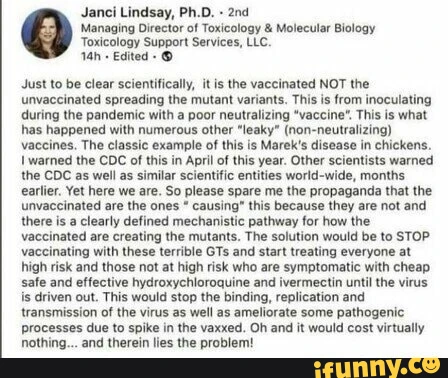
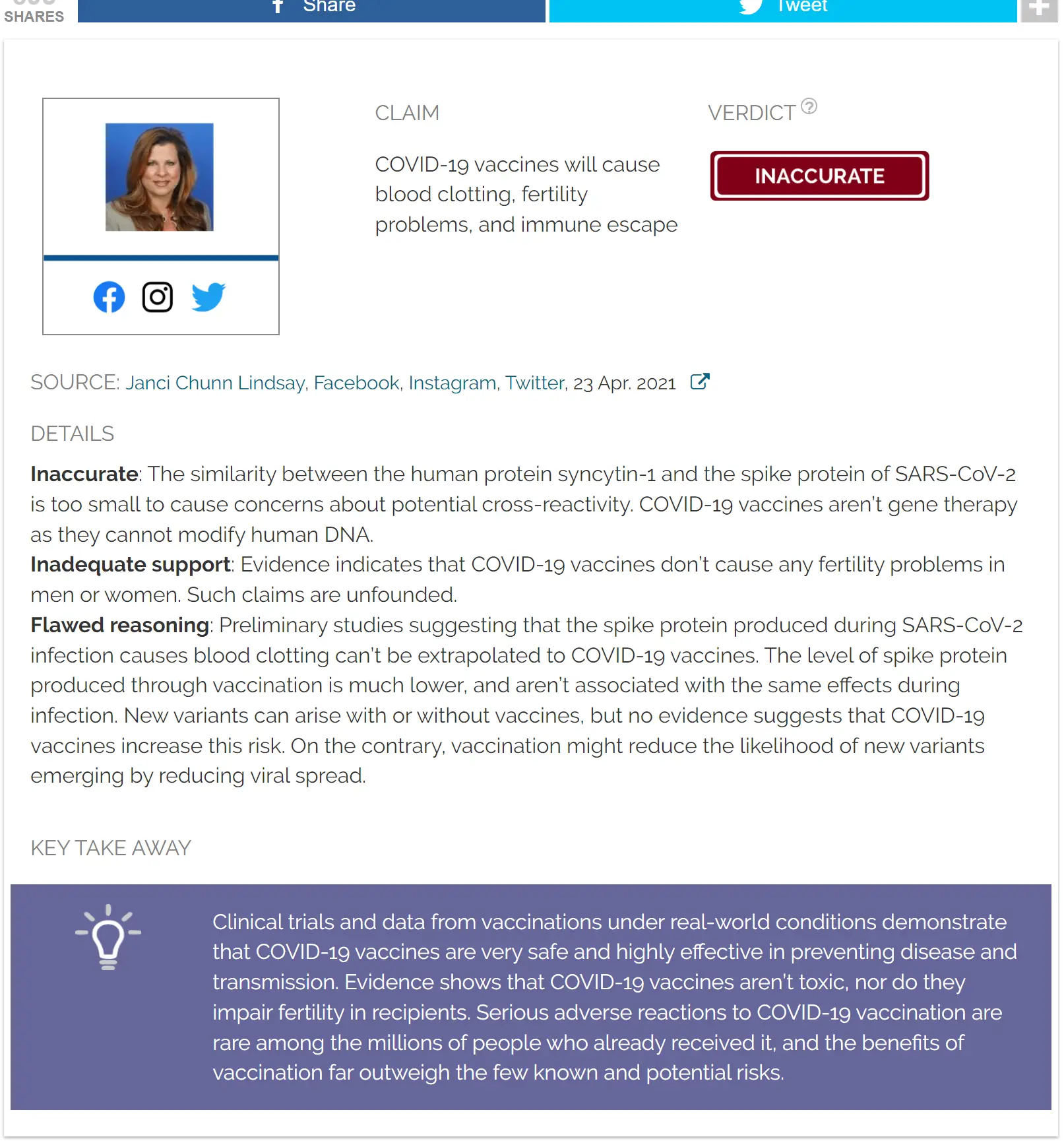
 April 30, 2023
April 30, 2023
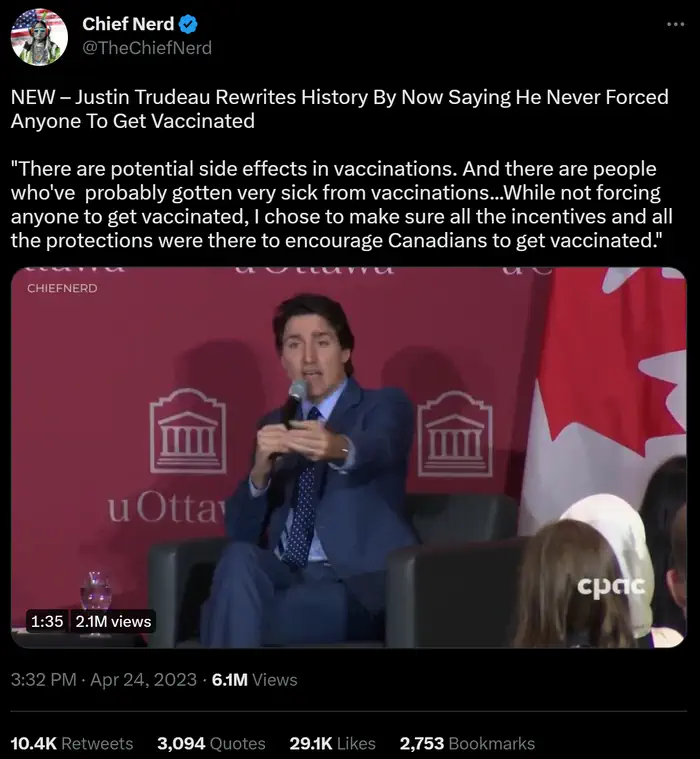 April 25, 2023
April 25, 2023
 April 24, 2023
April 24, 2023
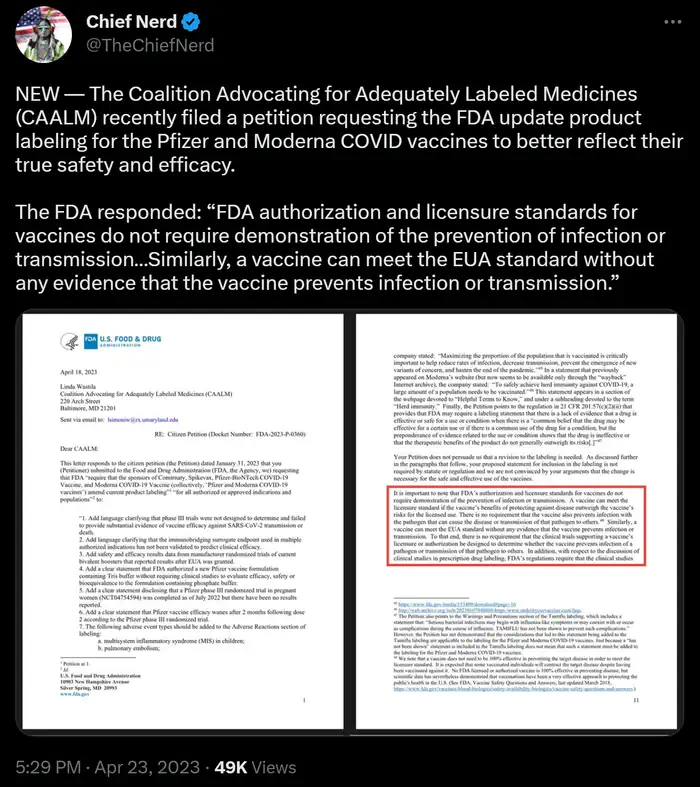 April 23, 2023
April 23, 2023
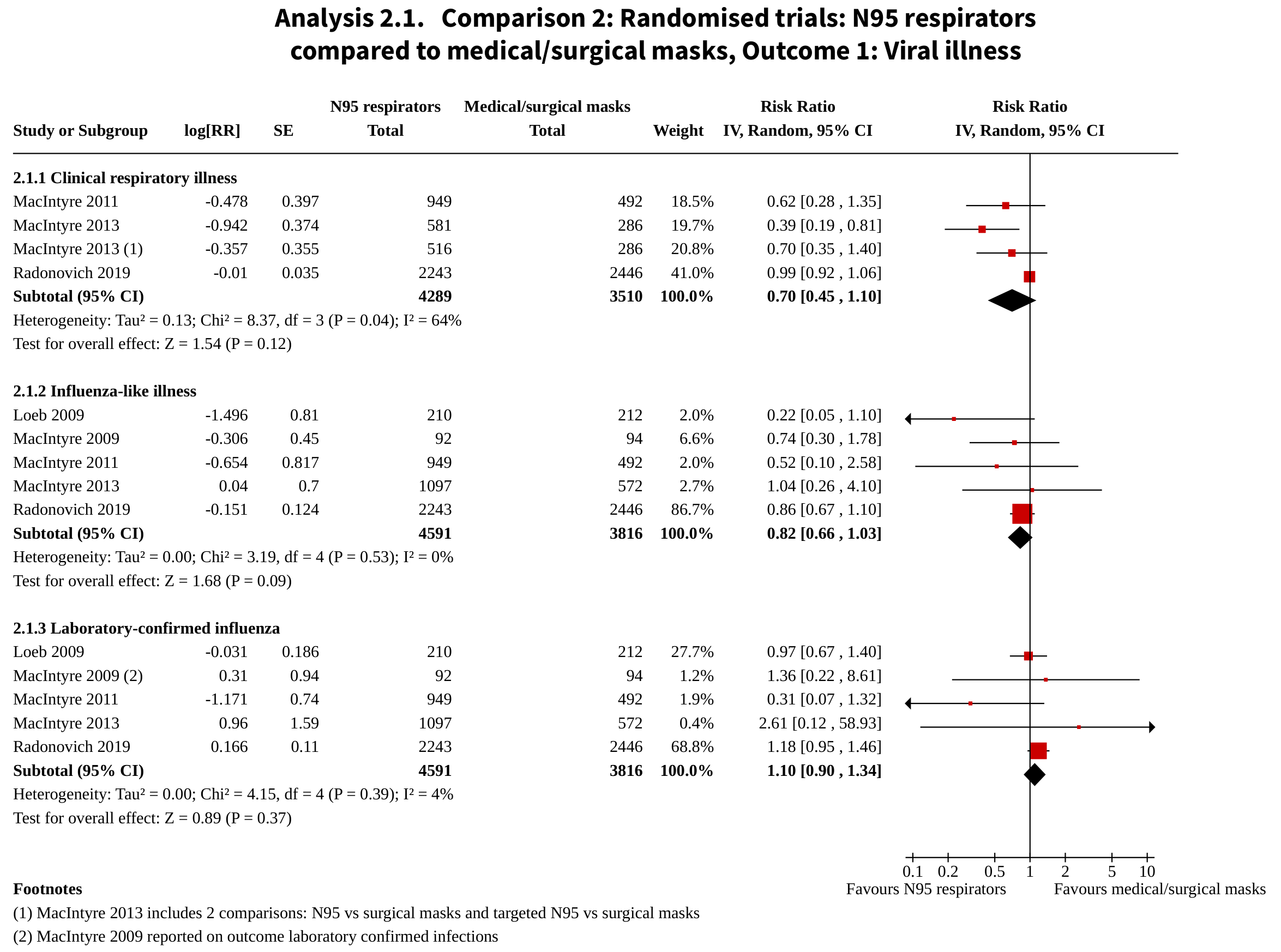 February 1, 2023
February 1, 2023
 January 27, 2023
January 27, 2023
 December 26, 2022
December 26, 2022
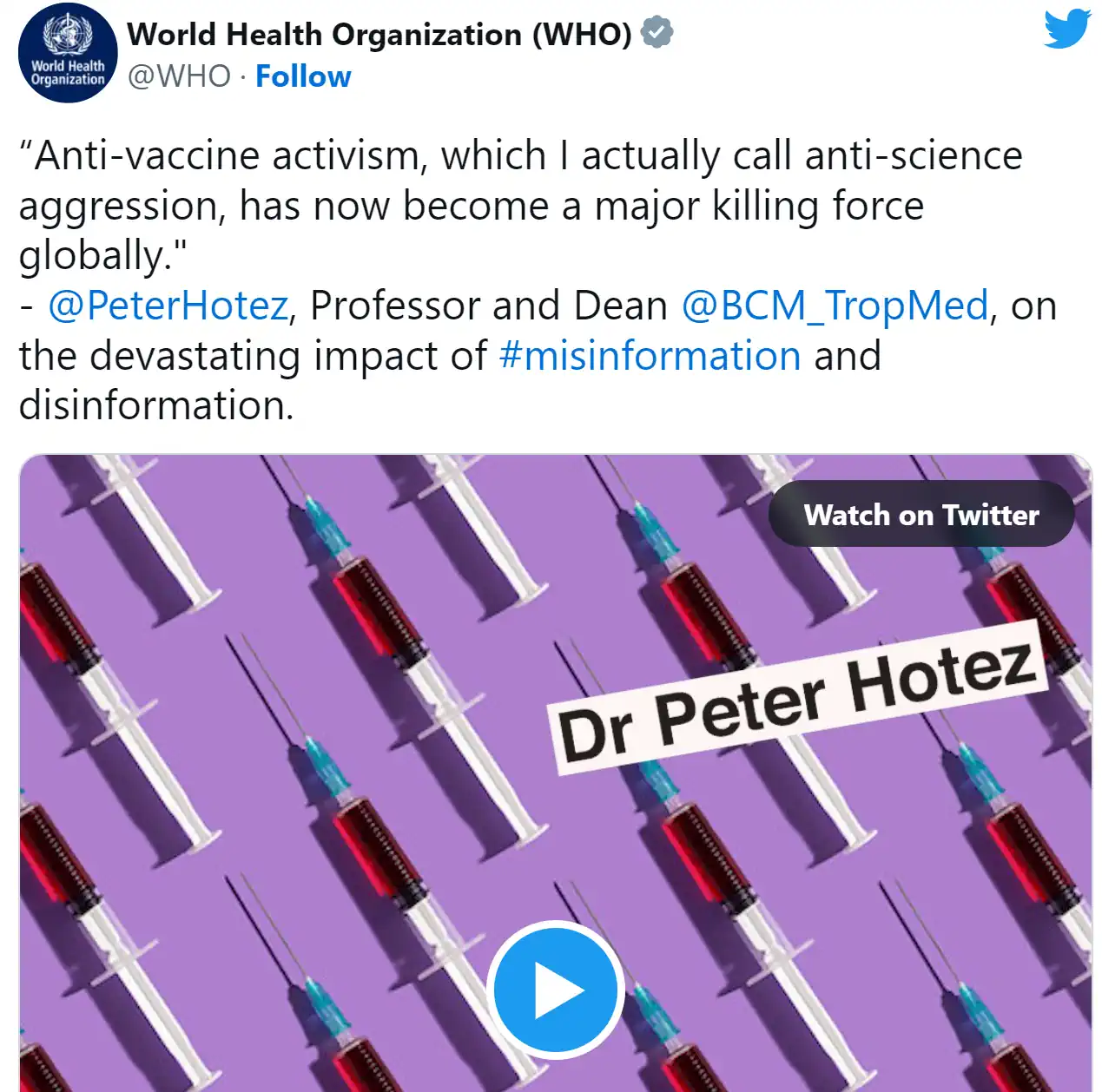 December 20, 2022
December 20, 2022
 December 20, 2022
December 20, 2022
 December 18, 2022
December 18, 2022